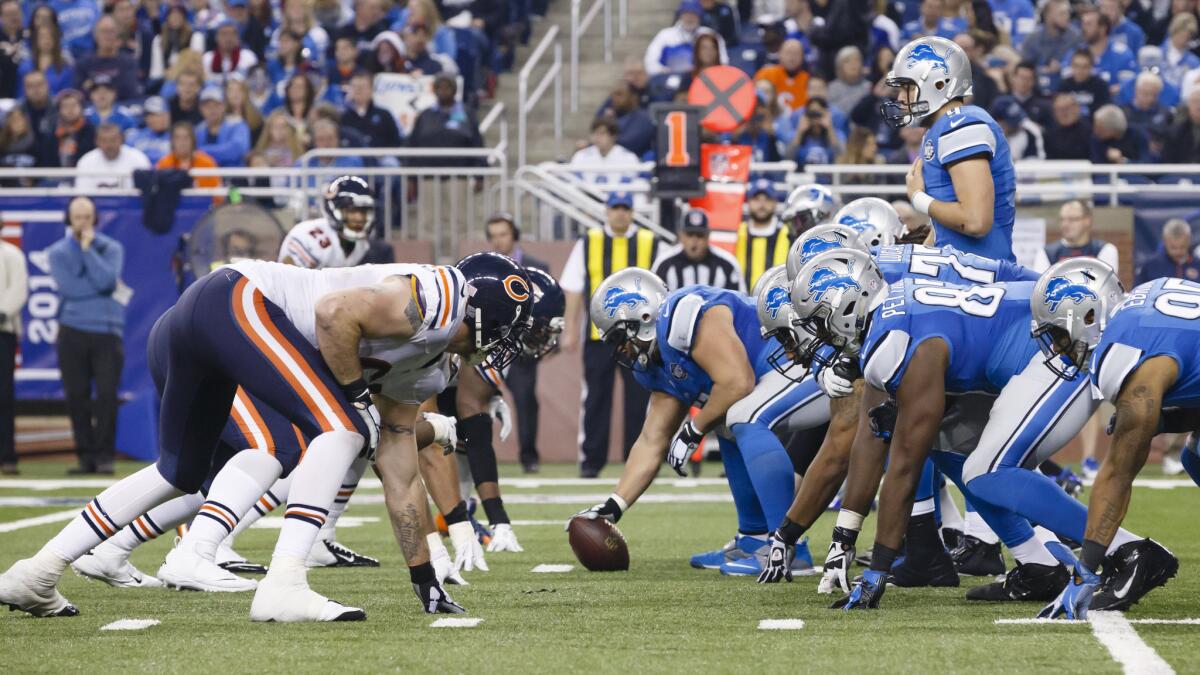Ask Sam Farmer: How does anyone call false-start penalties anymore?

- Share via
Have a question about the NFL? Ask Times NFL writer Sam Farmer, and he will answer as many as he can online and in the Sunday editions of the newspaper throughout the season. Email questions to: sam.farmer@latimes.com
Question: How does anyone call false-start penalties anymore? When things are calm and the offensive line gets set, I understand. But now, with the quarterbacks calling audibles, there seems to be no end to linemen bobbing up and down, pointing out defenders to block, the guards tapping the centers to signal the snap, there is often no stoppage of movement before the snap.
Christopher Berry
Glendale
Farmer: Some NFL defensive linemen wonder the same thing. I asked San Diego Chargers outside linebacker Dwight Freeney, and he had an opinion: “The game is so offensive-slanted, it’s a joke, and I don’t think they’ll ever change it because they’re making a lot of money. Offensive linemen are moving way before the ball’s going. [Officials] are not going to call it. They should, but they don’t. Why? Because all of that is about protecting the quarterback, and that’s their main objective. So they have rules, but they’re not so strict on those. But if you do it as a defensive player and you accidentally flinch, you’re not even in the neutral zone, they’re going to call it. But here’s my thing: Why is it OK that an offense can hard-count you, try to get you to jump offsides, but it’s not OK for the defense to do the same? I haven’t heard one good explanation why.”
More measured was Baltimore Ravens Coach John Harbaugh, who said the NFL is moving in the direction of college football, which allows more latitude for pre-snap movement at the line of scrimmage. “It used to be stricter in the NFL,” Harbaugh said. “Once you put that hand down, you couldn’t move at all. We talked about going back to that strict standard and it was decided not to do that. That’s fine. We just feel like there’s so much communication that needs to be done to handle all the pressures and the blitzes and protect the quarterbacks.”
Question: As the clock winds down at the end of each half, the quarterback will often hurry to the line and spike the ball. Since this is within the tackles, why is it not considered intentional grounding and penalized?
Gary Emerling
Westlake Village
Farmer: NFL rules say that a player under center “is permitted to stop the game clock legally to save time if, immediately upon receiving the snap, he begins a continuous throwing motion and throws the ball directly into the ground.”
However, if that player delays that spike for strategic purposes, including dropping back at all, it is intentional grounding, even if he’s under no pressure from pass rushers. Case in point: In a 2011 game at Oakland, Chicago quarterback Caleb Hanie motioned for a spike to stop the clock. When he got the ball, he acted as if he were going to fake the spike, then committed to spiking the ball. That little hiccup led to an intentional-grounding call, which triggered a 10-second runoff that ended the game.
More to Read
Go beyond the scoreboard
Get the latest on L.A.'s teams in the daily Sports Report newsletter.
You may occasionally receive promotional content from the Los Angeles Times.











